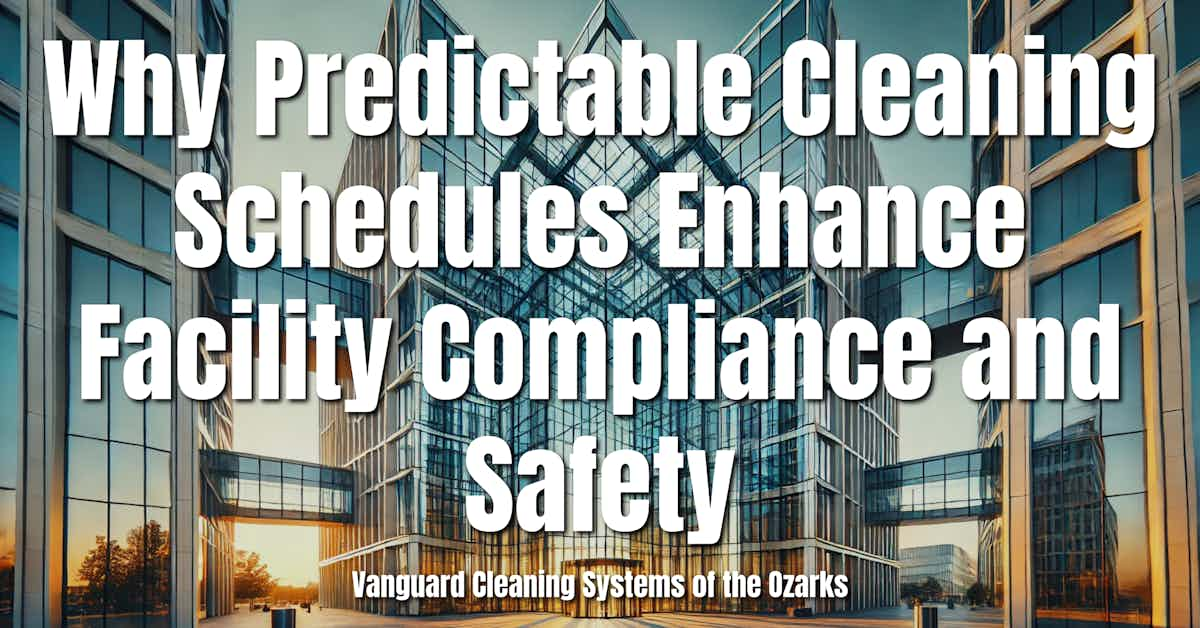Compliance doesn’t start with inspections—it starts with the cleaning schedule your team follows every day without fail.

Introduction: The High Stakes of Inconsistent Cleaning
In any commercial or healthcare facility, cleanliness isn't just a matter of aesthetics—it's a critical component of operational safety and regulatory compliance. Yet many organizations still rely on irregular or reactive cleaning practices that fall short of today’s standards. These inconsistencies not only increase the risk of contamination and illness but also leave facilities vulnerable to audit failures and costly penalties.
Predictable cleaning schedules offer a structured approach that closes compliance gaps, reduces the burden on frontline staff, and provides measurable assurance to internal and external stakeholders. Backed by data and endorsed by global regulatory agencies, these routines do more than keep environments tidy—they support the entire infrastructure of safety, accountability, and performance.
The Regulatory Backbone: What the Standards Say
Predictable cleaning schedules aren’t optional—they’re the foundation of compliance.
What Regulators Expect
- Documented Procedures
Cleaning tasks must be written down, standardized, and followed consistently. - Validation & Monitoring
Cleaning must be proven effective through swab testing, rinse sampling, and analytical detection methods. - Health-Based Risk Limits
Cleaning frequency must be based on the risk of residue carryover—not guesswork or convenience. - Lifecycle Approach
It’s not enough to clean once. Facilities must maintain cleanliness over time and under real-world conditions.
What Happens Without a Schedule
- Gaps in documentation
- Failed audits
- Increased contamination risk
- Potential shutdowns or penalties
Why Predictability Wins
- Creates audit-ready consistency
- Supports staff accountability
- Builds confidence with regulators
- Aligns with global compliance standards
Facilities with predictable cleaning routines are more likely to pass inspections, avoid regulatory setbacks, and operate with confidence.
Rethink Cleaning with Subscription-Based Services
Explore how predictable cleaning plans can boost compliance, reduce risk, and transform your facility operations.
How Predictable Cleaning Prevents Cross-Contamination
Predictability isn't just about routine—it's about reducing risk at every level of your facility.
Contamination thrives on inconsistency.
Missed shifts. Skipped steps. Incomplete records. These aren’t rare mistakes—they’re symptoms of cleaning schedules that rely on memory instead of method. When schedules are unpredictable, critical surfaces get overlooked, and risks accumulate unseen.
A fixed schedule locks in control.
When cleaning happens on time, every time, exposure pathways shrink. Residue from previous products, bodily fluids, or industrial materials doesn’t get a chance to linger. You don’t have to guess whether high-touch surfaces were wiped down—because it’s built into the plan.
What this looks like in practice:
- Daily disinfection of shared areas
- Weekly deep cleans of HVAC access points and equipment zones
- Scheduled validations after each cleaning cycle
- Real-time logs that prove compliance before anyone has to ask
It also simplifies training and accountability.
When staff know exactly what’s expected—and when—it removes ambiguity. Managers stop chasing compliance. Workers stop improvising. Everyone follows the same playbook.
The result?
Safer environments. Lower infection rates. And full confidence that your facility meets—and keeps—regulatory standards.
Real-World Outcomes: From Error Reduction to Compliance Wins
When cleaning becomes predictable, results become measurable. Facilities that commit to structured routines don’t just feel cleaner—they perform better under scrutiny.
One sterile processing department implemented scheduled pre-cleaning and transport routines. The initial error rate? Nearly 70%. Within months of standardizing the process, errors dropped below 1%. That change didn’t require new equipment—it required consistency.
A regional hospital facing regulatory pressure improved its cleanliness compliance from 63% to 100% in just eight weeks by introducing a daily leadership rounding schedule. Quarterly audits now average above 90%, and the facility passed its next inspection with zero deficiencies.
In another case, a hygiene campaign centered on scheduled handwashing reminders drove compliance from 61% to 94%. It wasn’t a shift in policy—it was a shift in rhythm.
Predictable schedules don’t just maintain cleanliness. They drive performance, reduce corrective action, and provide a defensible history of diligence when it matters most. That’s not theory—it’s what facilities are achieving right now.
Why It Matters for Facilities Today
The demand for cleanliness has never been higher—and neither has the scrutiny.
Inspections are more frequent.
Post-pandemic regulatory bodies are conducting audits with greater intensity and less tolerance for undocumented practices. A predictable cleaning schedule shows preparedness, not panic.
Reputation is on the line.
A single lapse in cleaning can lead to social media exposure, tenant complaints, or health department intervention. Consistency builds trust with employees, clients, and the public.
Liability risk is real.
Without a documented routine, facilities are more exposed to legal claims if contamination leads to illness, damage, or disruption. Predictable cleaning schedules provide a clear record of due diligence.
It’s a competitive differentiator.
Whether you're operating a hospital, a manufacturing plant, or a commercial property, buyers and tenants notice when environments are clean, organized, and professionally maintained. Cleanliness isn’t just a standard—it’s a sales point.
Today’s facilities can’t afford to rely on ad hoc cleaning. Predictability ensures performance, protects your brand, and prepares your operation for anything that comes through the door.
Master the Essentials of Cleaning Service Agreements
Learn how service level agreements (SLAs) set clear expectations, drive accountability, and protect your facility.
Frequently Asked Questions About Predictable Cleaning Schedules
What is a predictable cleaning schedule?
A predictable cleaning schedule is a recurring, time-based cleaning plan that outlines specific tasks, frequencies, and responsibilities to ensure consistent sanitation across a facility.
How does scheduling cleaning improve compliance?
It creates documented, repeatable routines that align with regulatory standards. This reduces risk, supports audit readiness, and ensures consistent execution by staff.
Can predictable cleaning reduce cross-contamination?
Yes. Regular intervals for disinfecting high-touch and shared surfaces significantly limit the opportunity for pathogens to spread between people, equipment, or environments.
Are scheduled cleanings better than reactive cleanups?
Absolutely. Scheduled cleanings are proactive, preventative, and measurable—while reactive cleaning typically occurs after a problem has already surfaced.
What industries benefit most from predictable cleaning?
Healthcare, manufacturing, education, and commercial property management all depend on routine cleaning to meet safety, operational, and regulatory demands.
References
- Galvan-Anderson, B. D., & Stancovici, A. G. (2020). Cleanliness Is Everyone's Business – a Multi-disciplinary Approach to Improving Environmental Cleanliness in an Acute Care Medical Center. American Journal of Infection Control, 48(8), S6. https://doi.org/10.1016/j.ajic.2020.07.015
- Grota, P., Kostroun, L., Willingham, M., & Przykucki, J. (2006). Improved Hand Hygiene Compliance through “I Save Lives with Clean Hands” Campaign. American Journal of Infection Control, 34(5), E75. https://doi.org/10.1016/j.ajic.2006.05.142
- Beula, S., R, S., Y., R., M., V., & G., V. (2022). A Review on Cleaning Validation-Regulatory Guidelines for The Pharmaceutical Industry. Asian Journal of Pharmaceutical Research. https://doi.org/10.52711/2231-5691.2022.00026
- Mckinley, L., Goedken, C., Balkenende, E., Sherlock, S., Reisinger, H., Knobloch, M., Perencevich, E., & Safdar, N. (2021). A Qualitative Work System Analysis Using a Human Factors Engineering Approach to Evaluate Environmental Cleaning in Veterans’ Affairs Hospitals. Antimicrobial Stewardship & Healthcare Epidemiology : ASHE, 1, s62 - s63. https://doi.org/10.1017/ash.2021.121
- Holdsworth, J. (2021). Making Safety “Instrumental” Across the Facility—A Sterile Processing Journey to Standardize Pre-cleaning and Transport. American Journal of Infection Control, 49(6), S5. https://doi.org/10.1016/j.ajic.2021.04.018
- Maurya, S., Goyal, D., & Verma, C. (2016). Cleaning Validation in Pharmaceutical Industry- An Overview. , 4, 14-20. https://www.pharmatutor.org/pdf_download/pdf/Vol.%204,%20Issue%209,%20September%202016,%20PharmaTutor,%20Paper-1.pdf
Conclusion: Compliance Doesn’t Happen by Chance
Facility compliance is built on habits—not hope. Unpredictable cleaning leads to gaps, oversights, and liability. Predictable routines, on the other hand, create order where there could be chaos.
- They make documentation easier.
- They make inspections smoother.
- They make outcomes safer.
When cleaning schedules are consistent, staff don’t need to guess. Auditors don’t need to dig. Leadership doesn’t need to wonder if the job is getting done—because it’s already part of the operating rhythm.
The result isn’t just a cleaner space.
It’s a facility that performs better, proves compliance, and earns trust every day it opens its doors.
For modern organizations, that’s not just a benefit—it’s a necessity.
Vanguard Cleaning Systems® of the Ozarks' franchise-owned custodial service provider business cleans more than 8M sq. ft. weekly, maintaining an industry-topping 95+% of its customer base, year-over-year, and boasting more than 60 5-star Google reviews.
Need more capability from your vendor partners? --Let's talk.
In Oklahoma, dial 918-960-4450
In Arkansas, dial 479-717-2410
In Missouri, dial 417-812-9777

